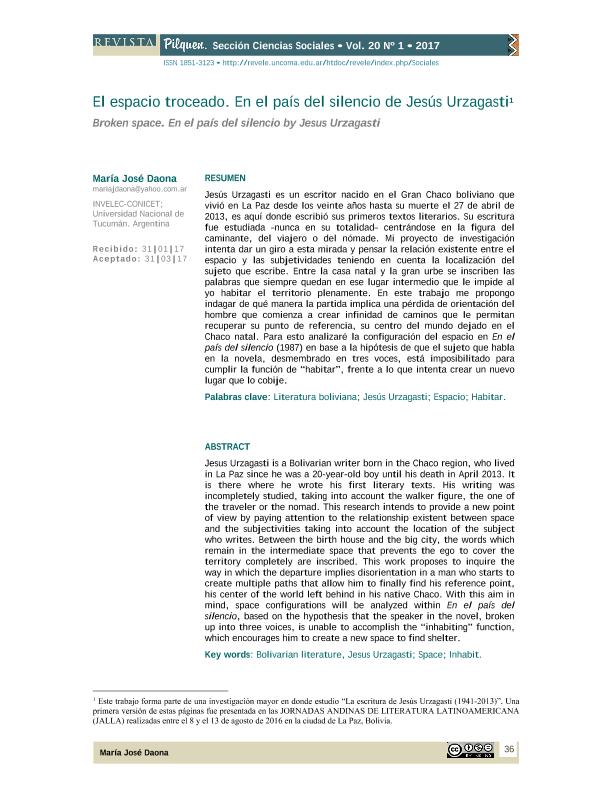Artículo
Jesús Urzagasti es un escritor nacido en el Gran Chaco boliviano que vivió en La Paz desde los veinte años hasta su muerte el 27 de abril de 2013, es aquí donde escribió sus primeros textos literarios. Su escritura fue estudiada –nunca en su totalidad– centrándose en la figura del caminante, del viajero o del nómade. Mi proyecto de investigación intenta dar un giro a esta mirada y pensar la relación existente entre el espacio y las subjetividades teniendo en cuenta la localización del sujeto que escribe. Entre la casa natal y la gran urbe se inscriben las palabras que siempre quedan en ese lugar intermedio que le impide al yo habitar el territorio plenamente. En este trabajo me propongo indagar de qué manera la partida implica una pérdida de orientación del hombre que comienza a crear infinidad de caminos que le permitan recuperar su punto de referencia, su centro del mundo dejado en el Chaco natal. Para esto analizaré la configuración del espacio en En el país del silencio (1987) en base a la hipótesis de que el sujeto que habla en la novela, desmembrado en tres voces, está imposibilitado para cumplir la función de “habitar”, frente a lo que intenta crear un nuevo lugar que lo cobije. Jesus Urzagasti is a Bolivarian writer born in the Chaco region, who lived in La Paz since he was a 20-year-old boy until his death in April 2013. It is there where he wrote his first literary texts. His writing was incompletely studied, taking into account the walker figure, the one of the traveler or the nomad. This research intends to provide a new point of view by paying attention to the relationship existent between space and the subjectivities taking into account the location of the subject who writes. Between the birth house and the big city, the words which remain in the intermediate space that prevents the ego to cover the territory completely are inscribed. This work proposes to inquire the way in which the departure implies disorientation in a man who starts to create multiple paths that allow him to finally find his reference point, his center of the world left behind in his native Chaco. With this aim in mind, space configurations will be analyzed within En el país del silencio, based on the hypothesis that the speaker in the novel, broken up into three voices, is unable to accomplish the “inhabiting” function, which encourages him to create a new space to find shelter.
El espacio troceado: En el país del Silencio de Jesús Urzagasti
Título:
Broken space: En el país del silencio by Jesus Urzagasti
Fecha de publicación:
06/2017
Editorial:
Universidad Nacional del Comahue. Centro Universitario Regional Zona Atlántica
Revista:
Pilquen
ISSN:
1851-3123
Idioma:
Español
Tipo de recurso:
Artículo publicado
Clasificación temática:
Resumen
Palabras clave:
Literatura Boliviana
,
Jesús Urzagasti
,
Espacio
,
Habitar
Archivos asociados
Licencia
Identificadores
Colecciones
Articulos(INVELEC)
Articulos de INSTITUTO DE INVESTIGACIONES SOBRE EL LENGUAJE Y LA CULTURA
Articulos de INSTITUTO DE INVESTIGACIONES SOBRE EL LENGUAJE Y LA CULTURA
Citación
Daona, María José; El espacio troceado: En el país del Silencio de Jesús Urzagasti
; Universidad Nacional del Comahue. Centro Universitario Regional Zona Atlántica; Pilquen; 20; 1; 6-2017; 36-43
Compartir




